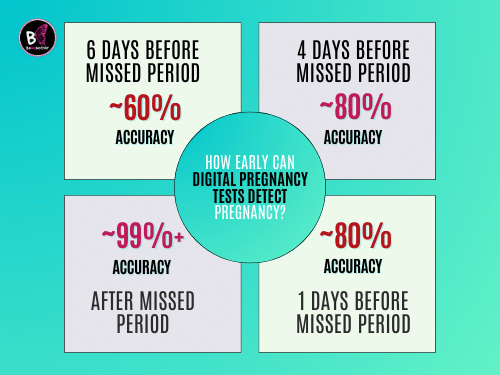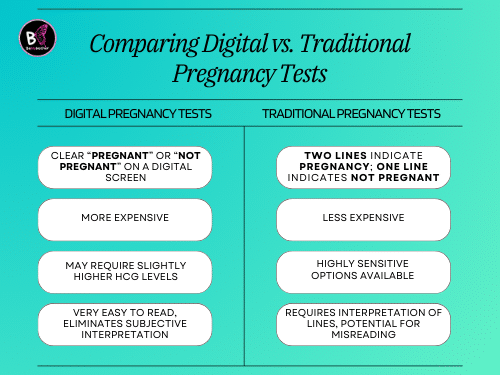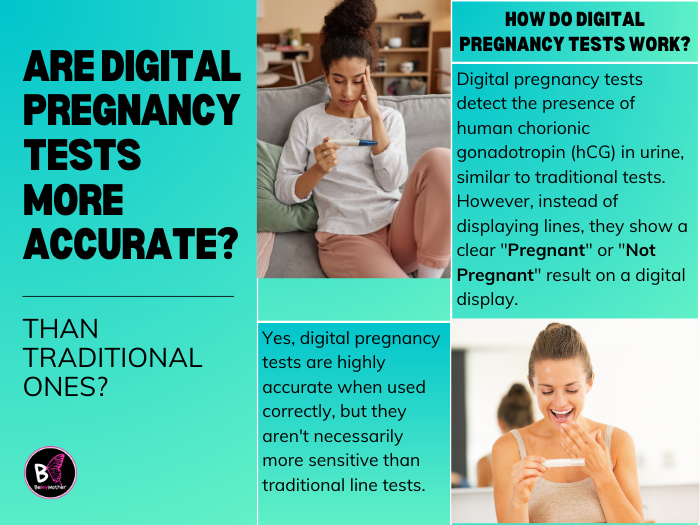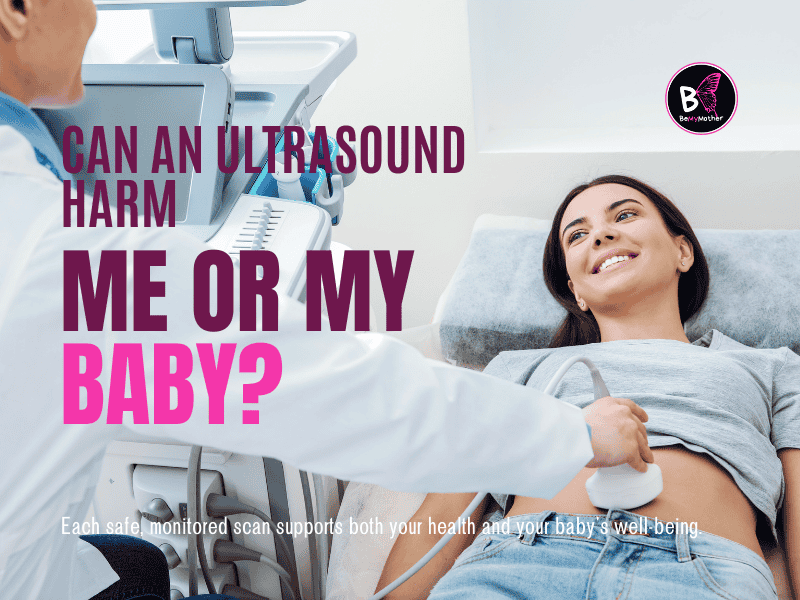📌 Quick Answer: Yes, digital pregnancy tests are highly accurate when used correctly, but they aren’t necessarily more sensitive than traditional line tests. Their main advantage is clear, easy-to-read results—instead of interpreting faint lines, they display “Pregnant” or “Not Pregnant” for a straightforward answer.
If you’re wondering are digital pregnancy tests more accurate than traditional ones, you’re not alone. Many women find line tests confusing, especially when dealing with faint lines, evaporation marks, or unclear results. In this article, we’ll explore how digital pregnancy tests work, their accuracy compared to standard tests, and when to take them for the most reliable results.
1. Are Digital Pregnancy Tests More Accurate?
Digital pregnancy tests function similarly to traditional tests but eliminate user interpretation errors.
How Do Digital Pregnancy Tests Work?
✔ They detect hCG (human chorionic gonadotropin) in urine.
✔ A sensor scans the test strip, determining if hCG levels are high enough to indicate pregnancy.
✔ Instead of lines or symbols, the test screen displays a clear message: “Pregnant” or “Not Pregnant”.
Accuracy Comparison: Digital vs. Traditional Line Tests
| Test Type | Accuracy Rate | Key Difference |
| Digital Test | 99% (when used correctly) | Eliminates misinterpretation of faint lines |
| Line Test | 99% (when used correctly) | Requires the user to interpret line darkness |
🔍 Research Insight: A study published in PubMed study compared the Clearblue Digital Pregnancy Test (CBDPT) with five alternative over-the-counter (OTC) brands of home pregnancy test (HPT) and found that the CBDPT detected hCG in the 25 IU/l positive urine with 100% accuracy when read by volunteers. Moreover, all volunteers (100%) rated the results with the CBDPT as ‘very certain’ or ‘certain’.
Source: pubmed.ncbi.nlm.nih.gov
2. How Do Digital Pregnancy Tests Detect hCG?
hCG is a pregnancy hormone produced by the placenta after implantation. The concentration of hCG doubles every 48-72 hours in early pregnancy, making it easier to detect as time progresses.
How Digital Tests Detect hCG:
✔ Test strip absorbs urine, detecting hCG presence.
✔ Electronic reader analyzes results, providing a binary “Pregnant” or “Not Pregnant” answer.
✔ Some tests even display “Weeks Indicator”, estimating how far along the pregnancy is.
🔍 Research Insight: Research at Washington University School of Medicine in St. Louis has shown that up to 5 percent of pregnancy tests return false negative results, even five or more weeks into the pregnancy, when hormone levels tend to be very high
Source: WashU Medicine
💡 Related Article: Noticing unusual symptoms and wondering if they signal pregnancy? Is Mouth Dryness a Sign of Pregnancy? 8 Surprising Facts Every Woman Should Know breaks down unexpected early pregnancy symptoms you might not be aware of.
3. Can Digital Pregnancy Tests Give False Results?
Truth About False Positive & False Negative Pregnancy Tests – Dr Lora Shahine
Yes, digital pregnancy tests can produce false positives or false negatives under certain conditions.
False Positives (Rare) – When a Test Shows “Pregnant” but You’re Not:
✔ Evaporation Lines Misread as hCG (less common in digital tests).
✔ Recent Pregnancy (hCG stays in the body for weeks after miscarriage).
✔ Fertility Treatments (hCG injections can cause false positives).
False Negatives (More Common) – When a Test Shows “Not Pregnant” but You Are:
✔ Testing Too Early – hCG levels may still be too low.
✔ Diluted Urine – First-morning urine is best for testing.
✔ Faulty Test or User Error – Incorrect usage can affect results.
🔍 Research Insight: The FDA states that the accuracy of a home pregnancy test depends on how well you follow the instructions and interpret the results. Mishandling or misunderstanding the test kit can lead to poor results. The FDA also notes that testing too early in your cycle, or too close to the time you became pregnant, can result in a false negative because the placenta may not have had enough time to produce enough hCG
Source: fda.gov
💡 Related Article: Wondering if urgent care can confirm your pregnancy? Does Urgent Care Do Pregnancy Tests? Everything You Need to Know in 8 Clear Points explains when and where to get tested.
4. How Early Can Digital Pregnancy Tests Detect Pregnancy?

Some digital pregnancy tests claim to detect pregnancy up to 6 days before a missed period, but their accuracy increases significantly after a missed period.
| Days Before Missed Period | Accuracy of Detection |
| 6 Days Before | ~60% |
| 4 Days Before | ~80% |
| 1 Day Before | ~98% |
| After Missed Period | 99%+ |
🔍 Research Insight: The American Journal of Public Health found that some home pregnancy tests detected pregnancy as early as 45.7% of the time, far below the 97%+ accuracy rates advertised.
Source: ajph.aphapublications.org
💡 Related Article: Need to take a glucose test during pregnancy? What to Eat for Breakfast Before Pregnancy Glucose Test: 8 Proven Strategies for the Best Results offers expert tips to help ensure accurate results.
5. Digital vs. Traditional Pregnancy Tests: Which is Better?

| Feature | Digital Test | Traditional Line Test |
| Accuracy | 99% when used correctly | 99% when used correctly |
| Ease of Use | Displays “Pregnant” or “Not Pregnant” | Requires interpretation of lines |
| Cost | More expensive | Budget-friendly |
| Sensitivity to Early Pregnancy | Some require higher hCG levels | Some detect lower hCG levels earlier |
✅ Best Choice: If you prefer clarity and ease of reading, a digital test is ideal. However, if testing early, a highly sensitive line test may detect pregnancy before a digital test can.
💡 Related Article: Curious if advanced fertility tracking can help detect pregnancy sooner? Can Inito Detect Pregnancy? 8 Essential Facts About Fertility Tracking You Shouldn’t Miss explores how Inito compares to traditional pregnancy tests.
6. Understanding Pregnancy Test Results: Faint Lines vs. Digital Readings
One major advantage of digital pregnancy tests is that they eliminate confusion caused by faint lines.
Why Do Line Tests Show Faint Lines?
✔ Low hCG levels in early pregnancy.
✔ Evaporation lines can appear if read outside the time window.
Why Are Digital Tests Clearer?
✔ Instead of lines, they provide a direct “Pregnant” or “Not Pregnant” result.
✔ They avoid the stress of analyzing faint lines.
7. Choosing the Most Reliable Pregnancy Test
Selecting a pregnancy test requires careful consideration of several factors to ensure reliable results.:
✔ Sensitivity – Some tests detect pregnancy earlier.
✔ Ease of Use – Digital tests remove guesswork.
✔ Cost – Digital tests are pricier, but may provide more confidence.
💡 Related Article: Thinking about stocking up on pregnancy tests? Bulk Pregnancy Tests: 7 Reasons to Help You Decide if They’re Worth It helps you determine if buying in bulk is a smart choice.
FAQ Section: Answering Common Questions About Digital Pregnancy Test Accuracy
Q1: Are digital pregnancy tests more accurate than traditional line tests?
A1: They are equally accurate but easier to read. Digital tests remove interpretation errors caused by faint lines.
Q2: Do digital pregnancy tests require higher hCG levels?
A2: Yes, some digital tests require slightly higher hCG than early detection line tests.
Q3: Can digital pregnancy tests give false negatives?
A3: Yes. Testing too early, using diluted urine, or not following instructions can cause false negatives.
Q4: How soon can a digital pregnancy test detect pregnancy?
A4: Some detect pregnancy up to 6 days before a missed period, but accuracy increases after a missed period.
Q5: Why did my digital test say “Not Pregnant,” but I got a positive later?
A5: Your hCG levels may have been too low at the time of the first test. Retest in 48 hours for a more accurate result.
Conclusion: Are Digital Pregnancy Tests More Accurate?
While digital pregnancy tests are not necessarily more sensitive, they are more user-friendly and eliminate confusion over faint lines. If you’re testing very early, a highly sensitive line test may detect pregnancy before a digital test can. However, if you want clear, easy-to-read results, digital pregnancy tests are a great option!
If you’re still unsure, wait a few days after your missed period, use first-morning urine, and choose a trusted brand for the best accuracy.



